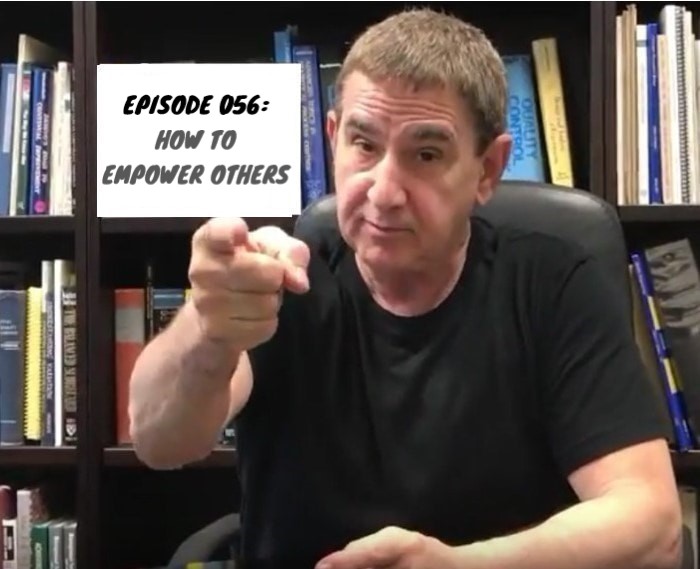This is a Better Way to Empower Others
This week’s video is about how to empower others to make their lives and/or jobs better.
What does it mean?
And, what are its implications?
Old Definition of How to Empower Others
To empower others relies loosely on the notion of dropping decision-making down to the lowest appropriate level in a group (family or organization). BUT, if you mess up, your head rolls.
So, you are not really empowered!
For example, suppose I tell my secretary that she has gotten a promotion to a salesperson and she is empowered to sell 5 cars next week. There are 9 other sales personnel.
According to the OLD definition of empowerment she is empowered to sell 5 cars next week.
Suppose that she doesn’t sell 5 cars,
I say: “you have to go back to your secretarial job because you didn’t make quota.”
So, I really didn’t empower her.
Better Definition of Empowerment
First, I say my former secretary is now empowered to sell 5 cars next week.
I spend the time to train her in the best practice method for selling cars that have been developed by the sales team so she can meet her quota.
Second, I empower her and her co-sales people to improve and/or innovate the best practice method with her fellow salespeople as a team, forever.
Please note, that if the best practice method does not deliver the desired results, the 10 salespeople are not blamed, the system/manager is blamed.
The manager may need more resources, for example, training, new equipment, etc.
BUT, the employees are blameless as long as they followed the best practice method.
Use It or Lose It – How to Empower Others
Recall, the new definition of how to empower others is operationalized at two levels.
First, employees in a team are empowered to standardize their work so there is only one method to improve.
Second, employees in a team are empowered to constantly improve the best practice method forever.
Remember, if the best practice method fails to deliver desired results, employees are NOT blamed; the method is, and management is responsible for the method.
When to Use It:
Use the new definition of how to empower others whenever you manage in an individual, group, or organization.
What Do You Think?
Are you empowered at work or at home? If yes, how do you know you are empowered. How do you empower others? Please share your thoughts in the comments below.
Until next time, behave and as always…Prime Your Pump!
–Howie
If you enjoyed this post, it would mean the world to us if you shared it with people you care about via any of the social media platforms below!
Popular Previous Posts:
This is How to Help Others Deal with Change
How to Be Happier: My Issue with an 80 Year Harvard Study
11 Powerful Metaphors About Life That Will Inspire You!
Psychology of Time: What is Your Time Perspective?
Circle of Competence: This is Why You Need to Stay in Yours!


So true— knowledge and know how empower!
Definitely one of your best. If someone is following directions exactly and the whole process or procedure goes off course towards that small mythical German village of Hellenbach, you cannot blame the person. The process itself is the problem, not the person. I have been there, I have done that, and I have fixed it. Both in the Air Force and in the aerospace industry I spent many hours reading procedures and trying to make them foolproof. Sometimes you get it right on the first try, sometimes it takes a month or more to work out all the bugs. I have also sat down with the technicians operating the equipment and asked them if anything in the procedure might be confusing or vague. And yes, their ideas made sense, as these guys are giving me the opinions and suggestions of the hands-on people, not the systems engineer.
I never blamed the person operating the test equipment. If a procedural step seems confusing or vague, break it up into sub-steps; like 21a, 21b, 21c, and so on. Insert a Caution in the procedure that the next step is time dependent. In other words, make it such that any confusion or mis-interpretation is eliminated. Have someone else read over your inputs and suggestions and see if they make sense to him/her. Two sets of eyes are better than one.
Fix the process, not the person.
And this reminds me of my favorite sayings in the aerospace business – “What is my reward for an on-time failure?”